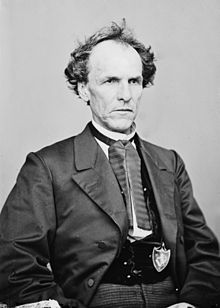James H. Lane (politician)
| James Henry Lane | |
|---|---|
 |
|
|
United States Senator from Kansas |
|
|
In office April 4, 1861 – July 11, 1866 |
|
| Preceded by | (none) |
| Succeeded by | Edmund G. Ross |
| Member of the U.S. House of Representatives from Indiana's 4th district |
|
|
In office March 4, 1853 – March 3, 1855 |
|
| Preceded by | Samuel W. Parker |
| Succeeded by | William Cumback |
| 11th Lieutenant Governor of Indiana | |
|
In office December 5, 1849 – January 10, 1853 |
|
| Governor | Joseph A. Wright |
| Preceded by | Paris C. Dunning |
| Succeeded by | Ashbel P. Willard |
| Personal details | |
| Born |
June 22, 1814 Lawrenceburg, Indiana |
| Died | July 11, 1866 (aged 52) Leavenworth, Kansas |
| Political party | Republican |
| Spouse(s) | Mary E. Lane |
| Military service | |
| Allegiance | United States of America |
| Service/branch |
United States Army Union Army |
| Years of service | 1846 – 1848, 1861 – 1862 |
| Rank |
|
| Battles/wars |
Mexican-American War American Civil War |
James Henry Lane also known as Jim Lane (June 22, 1814 – July 11, 1866) was a partisan during the Bleeding Kansas period that immediately preceded the American Civil War. During the war, Lane served as a United States Senator and as a general who fought for the Union. Although reelected as a Senator in 1865, Lane committed suicide the following year.
The son of Amos Lane, Lane was born in Lawrenceburg, Indiana, where he practiced law when he was admitted to the bar in 1840. During the Mexican-American War, he successively commanded the 3rd and 5th Indiana Regiments. He was a U.S. congressman from Indiana (1853–1855) where he voted for the Kansas-Nebraska Act.
He moved to the Kansas Territory in 1855. He immediately became involved in the abolitionist movement in Kansas, and was often called the leader of the Jayhawkers, a leading Free Soil militant group. After the Free Soilers succeeded in getting Kansas admitted to the Union in 1861 as a free state, Lane was elected as one of the new state's first U.S. Senators, and reelected in 1865. During that time he presided over the Topeka convention.
During the American Civil War, in addition to his Senate service, Lane raised a brigade of "Jayhawkers" known as the "Kansas Brigade", or "Lane's Brigade", composed of the Third, Fourth, and Fifth Kansas Volunteers. He led this mixed force into action against pro-Southern General Sterling Price of Missouri in the Battle of Dry Wood Creek as Price began an offensive early in the War to retake Missouri for the pro-Confederate state government that had been deposed by pro-Union forces around St. Louis. Lane lost the battle but stayed behind and attacked pro-South pockets in Missouri behind Price. His raids culminated in the Sacking of Osceola, in which Lane's forces killed at least nine men, then pillaged, looted, and then burned the town; these events inspired the novel Gone to Texas by Forrest Carter, which was the basis for the 1976 Clint Eastwood movie The Outlaw Josey Wales. Lane was severely criticized for his actions in Osceola, most severely by General Henry Halleck, then Commander of the Department of Missouri. Of their actions, he would state: "The course pursued by those under Lane and Jennison has turned against us many thousands who were formerly Union men. A few more such raids will make this State unanimous against us." Thus, Lane's Brigade was ended.
...
Wikipedia
